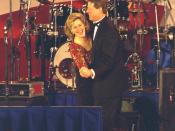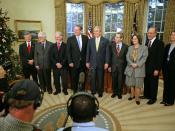In attempting to appeal to various particular audiences, Vice President Al Gore and Governor George W. Bush inevitably targeted similar groups in their acceptance speeches. The purpose of both speeches having been to inform and persuade encouraged the speakers to use tone as the vehicle towards fulfilling their purpose. In recognizing that the candidates targeted several particular audiences both were struggling to appeal to, it became necessary to have their individual appeals towards their audiences outweigh that of their opponent. Inevitably, the writers of the speeches employed similar as well as unique stylistic elements in their compositions in order to make the greatest emphasis on tone. In appealing to families, the writers did not fail to recognize that families are fundamental to the development of intrinsic values in society and that the stability and security in family life is the foundation of legislative power. This is precisely why the appeal to families was accentuated to such a great degree in both acceptance speeches.
Through both common and varied uses of language and diction, the writers maintained an objective tone in order to appeal to American families.
The initial task of the writers was to recognize the issues American families dealt with, their needs, their income or lack thereof in order to present their proposed solutions in a clear and concise language. Although both sets of writers recognized the broad spectrum of family types, Gore's writers wrote a speech that would appeal more to the average American. Bush, on the other hand, presented a more philosophical and abstract approach to the issues in his language by including renowned founders, philosophers and poets. Nevertheless, both Gore and Bush made certain to avoid esoteric language for as such would inevitably have lead to a misinterpretation of tone and, as a direct result, meaning. When making important points, stating clichÃÂés, or emphasizing past accomplishments and future endeavors, both speakers made efficient use of simplistic language. When Gore stated, "The power should be in your hands,"àor when Bush added, "We will seize this moment of American promise,"àboth had summarized and made obvious that their objective is to fulfill the needs of families and to assist them in partaking in the process. The two speakers chose a most inclusive language to uphold the individual's right to participate in the seizing of American purpose. Through first and second person language, the speeches became a conversation in which the candidates made observations, promises and included families as part of the solution in the form of "we."àMoralistic language exposed the philosophies of the candidates and their views on the rights of parents to chose what type of education and entertainment their children aught to have. This particular type of language brought into account Bush's religious beliefs, the role of families and his pro-life perspective, which paralleled Gore's minor reference to God, believing in a woman's right to chose, and the magnanimous respect and honor, which "is not just a word, but an obligation,"àtowards families.
In redefining words to hold a more positive connotation to associate their purpose with, Gore and Bush attempt to uphold the validity of their individual proposals while belittling those of the competition. When Gore stated that, "we changed things, to help unleash your potential, and innovation and investment in the private sector, the engine that drives our economic growth,"ÃÂ key words with the appropriate connotation implied that the audience was, at some point, trapped and he played a part in freeing them. Ultimately, it is words such as "unleash"ÃÂ and "engine that drives"ÃÂ that reach the audience and instill in them a sense of gratitude and towards the speaker who left them emancipated following a time of oppression. Gore's speech tended to utilize diction with a more positive connotation and applied terms such as "pioneer,"ÃÂ "New Frontier,"ÃÂ and "City of Angels"ÃÂ to create an atmosphere of renovation that is more appealing to families concerned with just how Gore plans to "invest in health care, education, a secure retirement, and [focus on] middle class tax cuts."ÃÂ Bush, on the other hand, presents an oration that focuses on associating him with past accomplishments and future endeavors while completely disassociating himself with any negative aspects of society. Unlike Gore, who had no choice than to associate himself with the past but encouraged the rejuvenation of it, Bush linked himself to the successful "generation of Americans who stormed beaches, liberated concentration camps and delivered us from evil."ÃÂ Words as powerful as "stormed,"ÃÂ "liberated,"ÃÂ and especially being "delivered"ÃÂ from evil add an enormous amount of credibility through their connotation to whomever they are applied to. Bush makes a point to establish a connection between himself and the construction of "great cities and grand alliances"ÃÂthe strong foundations of an American Century."ÃÂ Time and time again he uses the more compelling connotation of words to underscore his methods, his ideals, and his philosophies. Families who hear him make the "promise of prosperity"ÃÂ may very well find him more appealing than his competitor whom has "squandered"ÃÂ the moment and allowed for the "steady erosion of American power."ÃÂ Manipulating powerful positive and negative connotation certain words Bush and Gore employed diction in an attempt to appeal to families in all economic levels and ethnicities.
The emphasis on tone supported by the pillars of language and diction allowed for the objective nature of the orations to remain in perspective despite the differences in their applications. By taking into account family needs and upholding their values throughout the speeches in language and diction, each candidate was able to appeal to the same audience varying mildly in tone technique. Ultimately, Gore's use of a comprehensible language attracted the lower, middle and upper class American families whereas Bush's philosophical approach appealed mainly to the upper class family unit. This recognition ultimately entitled Gore's writers to assume that their utilization of tone and the stylistic elements that upheld the emphasis on tone worked to their favor.





